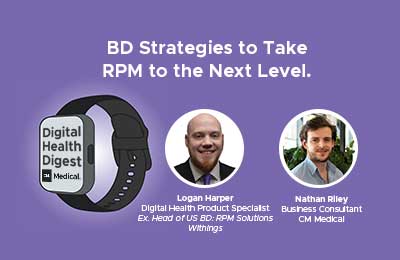

5 Femtech Companies Disrupting the Digital Health Market.
The term femtech generally refers to software, diagnostics, products and services, that use technology to support women's health. Femtech aims to offer support and solutions to women’s health issues through new product development and connectivity. Offering the ability to detect and monitor issues such as hormonal disorders, period pain, birth control, and sexual wellness, femtech has seen some major players, such as Natural Cycles and Elvie, step up to the global stage in the past few years.
The femtech sector is primarily concerned with addressing female health experiences, with innovations in the sector usually, but not exclusively, falling into one of the below key categories.
- Menstruation & Period Care Products
- Fertility & Birth Control
- Menopause
- Chronic Conditions & Hormonal Disorders
- Pelvic Health
- Pregnancy & Post Pregnancy
- Breast Feeding
- Sexual Wellness
- General Healthcare
Recent reports predict the femtech market to have a forecast potential of $50 Billion by 2025, with even bigger opportunities having arisen in the wake of COVID. At a time when everyone was refined to their bedrooms, digital solutions to real life problems became a necessity, and those designed specifically to meet women’s health challenges were offering something truly innovative, rather than rebrand of a wider medtech offering.
Alongside some more well-known names, there are a few key companies which I’ve had my eye on for revolutionising different aspects of female health. From highlighting and addressing difficult discussions, to ceasing the opportunities which have arisen as a result of popularity of femtech, these smaller femtech innovators are truly ones to watch.
Maven Clinic
Founded in 2014 by Kate Ryder, Maven provides critical support across fertility, pregnancy, adoption, parenting, and paediatrics. Its pioneering virtual care model is built around women and families, delivering better quality, personalised care at a lower cost. With an offering available for every family across different countries, cultures and backgrounds, Mavin is setting a new standard for family planning and care in the digital health space.
Maven’s aim is to improve digital engagement and maternal outcomes through a high-touch, digital maternity and fertility care model is truly innovative. Designed to complement whatever services the patient requires; it boasts fantastic results including 20% lower C-section rates and 32% lower NICU admission rates.
Rosy
Rosy is a female-focussed sexual wellness app comprised of videos, classes, stories, community groups and sexual coaching options. Providing advice on sexual education, with everything from low libido treatment to partner communication and body image. The app encourages education and growth with guided self-help classes and coaching created by doctors and psychologists. Each class offers evidence-based tools and actionable insights to help women cultivate a strong foundation and maintain confidence in their sexual wellness throughout life.
Founded by Dr. Lyndsey Harper, Rosy was born out of frustration when Harper realised, she couldn’t find a modern and accessible resource to help her many patients with issues of decreased sexual desire and advice.
The app also offers a safe community space dedicated to all things female sexual health. There is an opportunity to ask questions, seek advice, share experiences, and find support from likeminded people and professionals.
Pacify
Pacify offers a service to parents who feel their current options fall short. Providing low-cost, high-quality healthcare services to new and expecting parents. It is committed to helping all new parents, with a specific focus on those who can’t afford a subscription or who have needs that go beyond what’s available. Pacify’s “dual mission” is to build a sustainable company which offers better healthcare for new families.
With key missions including clinical excellence, empathy, health equity, innovation and teamwork, Pacify meets the needs of those who may otherwise be unable to receive the family support they need. Pacify has a core focus on increasing breastfeeding rates and support for new parents, as it states that research demonstrates that breast milk provides superior health, nutritional, economic, and emotional benefits to both mother and baby. It uses strong evidence-based recommendations from the American Academy of Paediatrics and the World Health Organization (WHO), whilst offering a support service which “never makes a Pacify user feel defensive, anxious, or insufficient”.
Pacify also strives to ensure fair opportunities through their innovative 24/7 digital platform, which connects those in need to healthcare, housing, education, or other relevant professionals whenever they require support.
Modern Fertility
Modern Fertility is primarily an at home fertility test provider, with additional options for home delivered fertility support, including ovulation and pregnancy tests and prenatal vitamins. It prides itself on a non-biased opinion towards female fertility, brought to life with the strapline:
We make fertility essentials for people with ovaries — whether you’re trying for kids or not.
An easy, innovative, affordable approach to understanding a female’s “reproductive career”. Whether it’s detecting silent health conditions such as early menopause and PCOS or wanting access to personal data just to keep track, Modern Fertility uses a simple app system to for users to manage their health and get ahead of discussions with a doctor or partner, as well as manage financial planning, or understand potential treatment needs.
Babyscripts
After noticing a critical shortage of obstetrical providers, Babyscripts was founded to offer comprehensive virtual maternity care for all women, whenever and wherever they need it. Despite arriving in the market six years ago, this service has been significant in ensuring remote support for pregnant women during long periods of isolation. The app addresses an outdated model for pregnancy care through managing various levels of risk, which is proven to decrease maternal morbidity and mortality.
Its virtual maternity care manages the various risk-levels of maternal health without the usual costs or complications. This innovative approach is focused on enabling providers to deliver prenatal care at any place, at any time through digital education and remote patient monitoring. Benefits include improved quality measures, reduced cost of maternity care and avoidance of complications for mother and baby.
What’s next?
Each of these innovative and exciting companies is forging a new pathway to resolve female health needs. In the wake of COVID patient’s expectations have changed and the privatisation of the U.S market means they are not just that, but customers looking for the most forward-thinking, attractive, efficient and affordable offer to meet their everyday needs.
I really look forward to keeping an eye on the impact these brands have on the femtech and wider digital health market. If you’d like to discuss this in some more detail with me, drop me an email at james.moore@cm-medical.com. Find more about the world of digital health at Charlton Morris, here.
Want to collaborate with us?
Charlton Morris is a Talent Solutions business who offer search, contract, volume and employer branding solutions to the medical markets.Fill out our contact form below to be featured in our latest articles, podcasts or videos.
Recommended.

Digital Health Digest: Using AI to Engage Patients and Fill Prescriptions.
Harris speaks with Nick Desai, founder of Renee, the first AI-driven personal health assistant for seniors. Nick shares insight into the platform's fascinating founding story, including gaining investment from Lionel Richie & Matt Damon. Listen now.
.jpg)
Digital Health Digest: Incentivising Exercise to Empower Employees.
In this episode, James speaks with Toby Cannon, an innovative young entrepreneur putting fitness in the workplace first with his company, Myles Wellbeing. An app changing the mindsets of desk-bound employees. Listen now.

Australian MedTech & Digital Health Start-Ups To Watch.
It’s an exciting and innovative time for Australian MedTech & Digital Health start-ups - what can we learn from their strategies and successes?

Digital Health Digest: BD Strategies to Take RPM to the Next Level.
In this episode, Nathan Riley, speaks with ex. Head of US Business Development at infamous global consumer electronics giant, Withings. Listen now.
Comments.